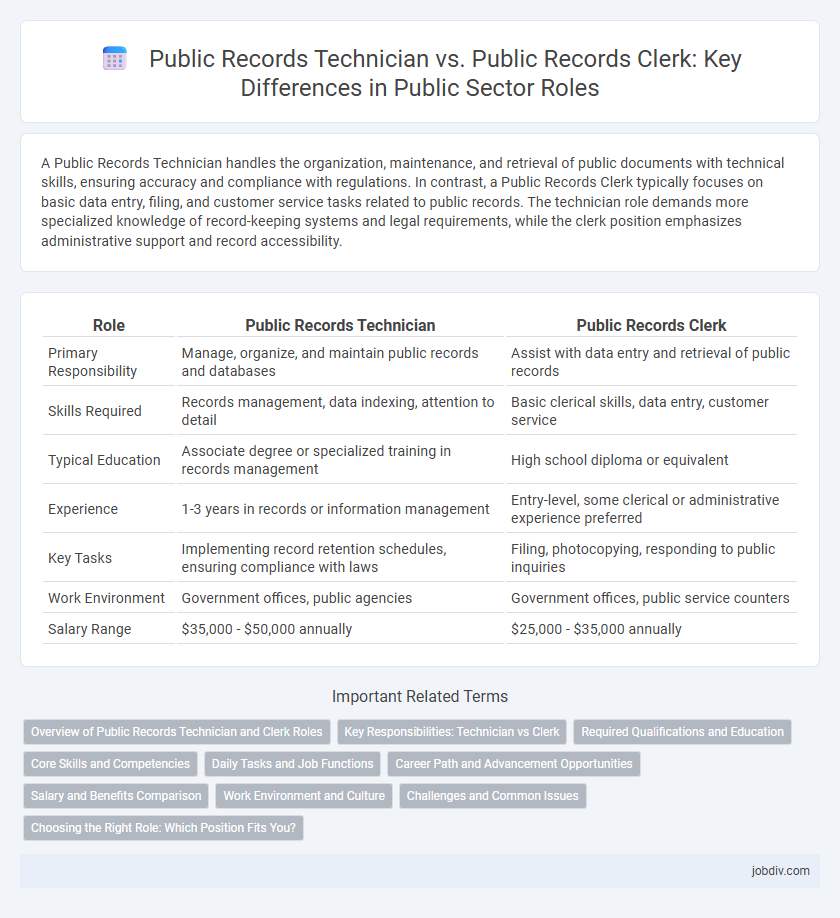A Public Records Technician handles the organization, maintenance, and retrieval of public documents with technical skills, ensuring accuracy and compliance with regulations. In contrast, a Public Records Clerk typically focuses on basic data entry, filing, and customer service tasks related to public records. The technician role demands more specialized knowledge of record-keeping systems and legal requirements, while the clerk position emphasizes administrative support and record accessibility.
Table of Comparison
| Role | Public Records Technician | Public Records Clerk |
|---|---|---|
| Primary Responsibility | Manage, organize, and maintain public records and databases | Assist with data entry and retrieval of public records |
| Skills Required | Records management, data indexing, attention to detail | Basic clerical skills, data entry, customer service |
| Typical Education | Associate degree or specialized training in records management | High school diploma or equivalent |
| Experience | 1-3 years in records or information management | Entry-level, some clerical or administrative experience preferred |
| Key Tasks | Implementing record retention schedules, ensuring compliance with laws | Filing, photocopying, responding to public inquiries |
| Work Environment | Government offices, public agencies | Government offices, public service counters |
| Salary Range | $35,000 - $50,000 annually | $25,000 - $35,000 annually |
Overview of Public Records Technician and Clerk Roles
Public Records Technicians manage and maintain government records with a focus on accuracy, compliance, and data retrieval, often using specialized software and databases. Public Records Clerks primarily handle the organization, filing, and basic processing of public documents to ensure accessibility and proper filing protocols. Both roles support transparency and efficient records management within public sector institutions.
Key Responsibilities: Technician vs Clerk
Public Records Technicians primarily manage the organization, maintenance, and electronic indexing of public documents to ensure accurate and efficient retrieval, often utilizing specialized software and databases. Public Records Clerks focus on handling customer service inquiries, processing requests for information, and maintaining physical records, emphasizing direct interaction and administrative support. While Technicians optimize data integrity and digital access, Clerks facilitate user accessibility and record distribution.
Required Qualifications and Education
Public Records Technicians typically require an associate degree or specialized training in records management, along with proficiency in database systems and information retrieval software. Public Records Clerks often need a high school diploma or equivalent, with on-the-job training focused on filing, indexing, and maintaining public records. Both positions benefit from knowledge of public records laws and attention to detail, but Technicians generally have more advanced technical and analytical skills.
Core Skills and Competencies
Public Records Technicians excel in advanced data management, legal document processing, and electronic records systems, demonstrating proficiency in compliance with government regulations and information security protocols. Public Records Clerks focus on foundational administrative skills, such as filing, data entry, and customer service, ensuring accurate record maintenance and retrieval. Both roles require attention to detail and knowledge of public records laws, but Technicians typically possess higher technical expertise and analytical abilities.
Daily Tasks and Job Functions
Public Records Technicians manage, organize, and maintain digital and physical public documents, ensuring data accuracy and compliance with legal standards. Public Records Clerks primarily assist in processing requests, filing documents, and supporting the retrieval of public information for government agencies. Both roles require attention to detail, but technicians often handle more technical tasks such as database management and records preservation.
Career Path and Advancement Opportunities
Public Records Technicians typically have more specialized training and handle complex data management tasks, positioning them for advancement into supervisory or records management roles. Public Records Clerks usually start with entry-level responsibilities focused on data entry and filing, with career growth often leading towards technician roles or administrative positions within public agencies. Progression in both careers relies on acquiring certifications in records management and gaining experience with digital records systems.
Salary and Benefits Comparison
Public Records Technicians typically earn a higher salary than Public Records Clerks, with average annual wages ranging from $40,000 to $55,000 compared to $30,000 to $45,000 for Clerks. Technicians often receive more comprehensive benefits packages, including health insurance, retirement plans, and paid leave, reflecting their advanced responsibilities and specialized skills. Public Records Clerks may have access to basic benefits but generally experience lower compensation and fewer perks due to entry-level job duties.
Work Environment and Culture
Public Records Technicians typically work in government offices or archives, often handling sensitive or legal documents in a structured, detail-oriented environment. Public Records Clerks usually operate in busy public service settings such as municipal offices, where interaction with the public and managing high volumes of paperwork is common. Both roles emphasize accuracy and confidentiality but differ in the level of direct public engagement and technical responsibilities.
Challenges and Common Issues
Public Records Technicians often face complex challenges such as managing large volumes of documents and ensuring compliance with evolving legal standards, which require advanced organizational and technical skills. Public Records Clerks commonly encounter issues including data entry errors, incomplete records, and difficulties in timely retrieval of information due to outdated filing systems. Both roles must address obstacles related to confidentiality, accurate indexing, and maintaining accessibility while safeguarding sensitive public information.
Choosing the Right Role: Which Position Fits You?
A Public Records Technician typically manages and organizes government documents with a strong emphasis on digital filing systems and data accuracy, requiring technical proficiency. A Public Records Clerk often performs routine administrative tasks such as filing, retrieving, and maintaining physical and electronic records, focusing on clerical skills. Assess your strengths in technology use versus administrative duties to determine which role aligns best with your career goals in public records management.
Public Records Technician vs Public Records Clerk Infographic

 jobdiv.com
jobdiv.com